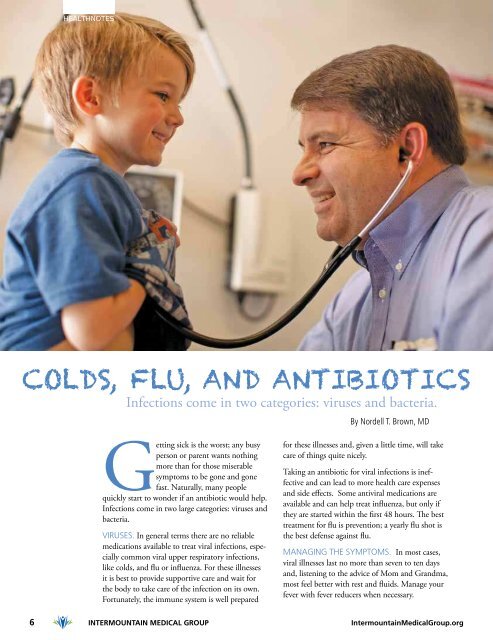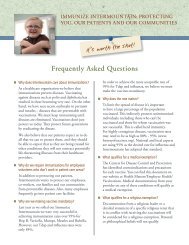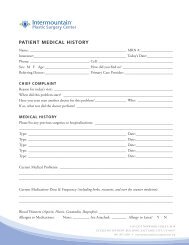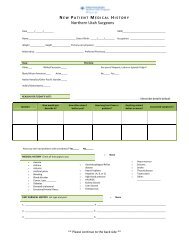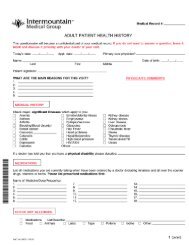Download the PDF - Intermountain Healthcare
Download the PDF - Intermountain Healthcare
Download the PDF - Intermountain Healthcare
Create successful ePaper yourself
Turn your PDF publications into a flip-book with our unique Google optimized e-Paper software.
Most of <strong>the</strong> time <strong>the</strong> immune system will take<br />
care of what is ailing you with time, rest, and patience.<br />
Colds, Flu, and Antibiotics<br />
Infections come in two categories: viruses and bacteria.<br />
Getting sick is <strong>the</strong> worst; any busy<br />
person or parent wants nothing<br />
more than for those miserable<br />
symptoms to be gone and gone<br />
fast. Naturally, many people<br />
quickly start to wonder if an antibiotic would help.<br />
Infections come in two large categories: viruses and<br />
bacteria.<br />
Viruses. In general terms <strong>the</strong>re are no reliable<br />
medications available to treat viral infections, especially<br />
common viral upper respiratory infections,<br />
like colds, and flu or influenza. For <strong>the</strong>se illnesses<br />
it is best to provide supportive care and wait for<br />
<strong>the</strong> body to take care of <strong>the</strong> infection on its own.<br />
Fortunately, <strong>the</strong> immune system is well prepared<br />
By Nordell T. Brown, MD<br />
for <strong>the</strong>se illnesses and, given a little time, will take<br />
care of things quite nicely.<br />
Taking an antibiotic for viral infections is ineffective<br />
and can lead to more health care expenses<br />
and side effects. Some antiviral medications are<br />
available and can help treat influenza, but only if<br />
<strong>the</strong>y are started within <strong>the</strong> first 48 hours. The best<br />
treatment for flu is prevention; a yearly flu shot is<br />
<strong>the</strong> best defense against flu.<br />
Managing <strong>the</strong> symptoms. In most cases,<br />
viral illnesses last no more than seven to ten days<br />
and, listening to <strong>the</strong> advice of Mom and Grandma,<br />
most feel better with rest and fluids. Manage your<br />
fever with fever reducers when necessary.<br />
It is important to seek<br />
medical help if a fever lasts<br />
more than three to five days<br />
or if <strong>the</strong> symptoms<br />
continue to worsen.<br />
Bacterial Infections. Antibiotics can help one<br />
feel better faster and in some cases avoid potentially<br />
severe complications when <strong>the</strong> cause of <strong>the</strong> illness<br />
is a bacterial infection. Some of <strong>the</strong> more common<br />
bacterial infections are ear infections, strep throat,<br />
and sinus infections. These are illnesses that respond<br />
well to antibiotics.<br />
When to seek immediate medical<br />
attention. O<strong>the</strong>r bacterial infections can become<br />
quite severe if not attended to promptly and treated<br />
appropriately. Visit your doctor if you experience<br />
worsening or a rebound of symptoms that seemed<br />
to have been starting to resolve. For example, ear<br />
pain or trouble hearing that begins five to seven<br />
days after <strong>the</strong> onset of a cold, or a fever that just<br />
won’t go away after three to five days.<br />
Severe infections such as pneumonia can hit hard<br />
and fast and are characterized by high fever and<br />
more severe cough. Ano<strong>the</strong>r alarming symptom is<br />
fever, headache, and stiff neck. One should seek<br />
immediate attention for <strong>the</strong>se symptoms.<br />
Most of <strong>the</strong> time <strong>the</strong> immune system will take care<br />
of what is ailing you with time, rest, and patience.<br />
Stay alert to “alarm” symptoms and seek help when<br />
necessary.<br />
Nordell T. Brown, M.D.<br />
Pediatrics<br />
Budge Clinic<br />
435.792.1940<br />
Watch for <strong>the</strong> following<br />
ALARM<br />
Symptoms<br />
Persistent fever lasting more<br />
than three to five days<br />
Ear pain or trouble hearing<br />
that begins five to seven days<br />
after <strong>the</strong> onset of a cold<br />
Worsening or rebound of<br />
symptoms that seemed to<br />
have started to resolve<br />
6 INTERMOUNTAIN MEDICAL GROUP <strong>Intermountain</strong>MedicalGroup.org<br />
<strong>Intermountain</strong>MedicalGroup.org 7


